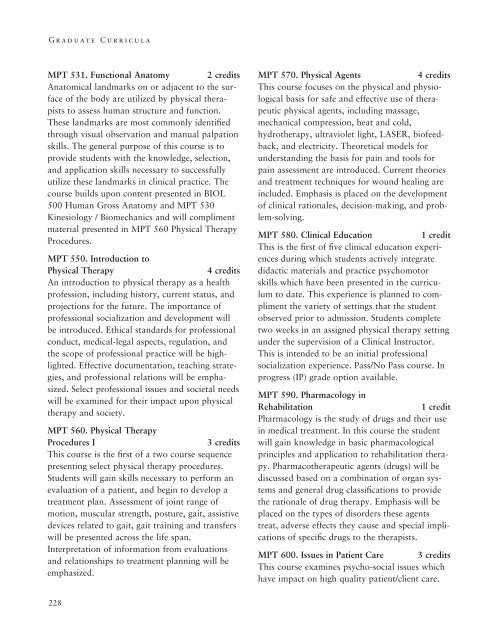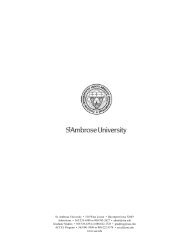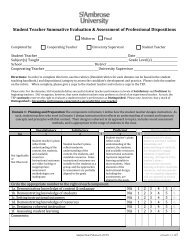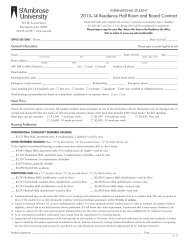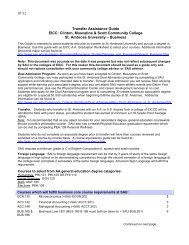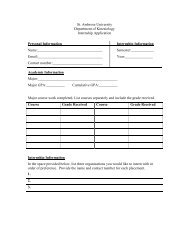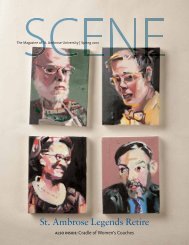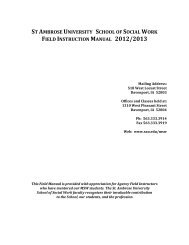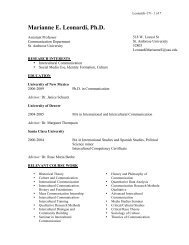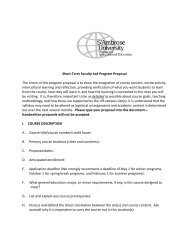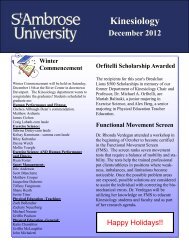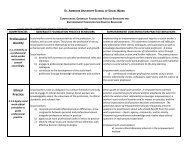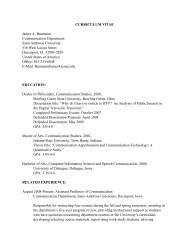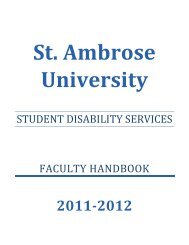St. Ambrose University 518 West Locust Davenport Iowa 52803 admit
St. Ambrose University 518 West Locust Davenport Iowa 52803 admit
St. Ambrose University 518 West Locust Davenport Iowa 52803 admit
You also want an ePaper? Increase the reach of your titles
YUMPU automatically turns print PDFs into web optimized ePapers that Google loves.
Graduate Curricula<br />
MPT 531. Functional Anatomy 2 credits<br />
Anatomical landmarks on or adjacent to the surface<br />
of the body are utilized by physical therapists<br />
to assess human structure and function.<br />
These landmarks are most commonly identified<br />
through visual observation and manual palpation<br />
skills. The general purpose of this course is to<br />
provide students with the knowledge, selection,<br />
and application skills necessary to successfully<br />
utilize these landmarks in clinical practice. The<br />
course builds upon content presented in BIOL<br />
500 Human Gross Anatomy and MPT 530<br />
Kinesiology / Biomechanics and will compliment<br />
material presented in MPT 560 Physical Therapy<br />
Procedures.<br />
MPT 550. Introduction to<br />
Physical Therapy<br />
4 credits<br />
An introduction to physical therapy as a health<br />
profession, including history, current status, and<br />
projections for the future. The importance of<br />
professional socialization and development will<br />
be introduced. Ethical standards for professional<br />
conduct, medical-legal aspects, regulation, and<br />
the scope of professional practice will be highlighted.<br />
Effective documentation, teaching strategies,<br />
and professional relations will be emphasized.<br />
Select professional issues and societal needs<br />
will be examined for their impact upon physical<br />
therapy and society.<br />
MPT 560. Physical Therapy<br />
Procedures I<br />
3 credits<br />
This course is the first of a two course sequence<br />
presenting select physical therapy procedures.<br />
<strong>St</strong>udents will gain skills necessary to perform an<br />
evaluation of a patient, and begin to develop a<br />
treatment plan. Assessment of joint range of<br />
motion, muscular strength, posture, gait, assistive<br />
devices related to gait, gait training and transfers<br />
will be presented across the life span.<br />
Interpretation of information from evaluations<br />
and relationships to treatment planning will be<br />
emphasized.<br />
MPT 570. Physical Agents<br />
4 credits<br />
This course focuses on the physical and physiological<br />
basis for safe and effective use of therapeutic<br />
physical agents, including massage,<br />
mechanical compression, heat and cold,<br />
hydrotherapy, ultraviolet light, LASER, biofeedback,<br />
and electricity. Theoretical models for<br />
understanding the basis for pain and tools for<br />
pain assessment are introduced. Current theories<br />
and treatment techniques for wound healing are<br />
included. Emphasis is placed on the development<br />
of clinical rationales, decision-making, and problem-solving.<br />
MPT 580. Clinical Education<br />
1 credit<br />
This is the first of five clinical education experiences<br />
during which students actively integrate<br />
didactic materials and practice psychomotor<br />
skills which have been presented in the curriculum<br />
to date. This experience is planned to compliment<br />
the variety of settings that the student<br />
observed prior to admission. <strong>St</strong>udents complete<br />
two weeks in an assigned physical therapy setting<br />
under the supervision of a Clinical Instructor.<br />
This is intended to be an initial professional<br />
socialization experience. Pass/No Pass course. In<br />
progress (IP) grade option available.<br />
MPT 590. Pharmacology in<br />
Rehabilitation<br />
1 credit<br />
Pharmacology is the study of drugs and their use<br />
in medical treatment. In this course the student<br />
will gain knowledge in basic pharmacological<br />
principles and application to rehabilitation therapy.<br />
Pharmacotherapeutic agents (drugs) will be<br />
discussed based on a combination of organ systems<br />
and general drug classifications to provide<br />
the rationale of drug therapy. Emphasis will be<br />
placed on the types of disorders these agents<br />
treat, adverse effects they cause and special implications<br />
of specific drugs to the therapists.<br />
MPT 600. Issues in Patient Care 3 credits<br />
This course examines psycho-social issues which<br />
have impact on high quality patient/client care.<br />
228


